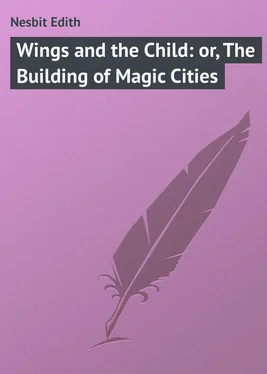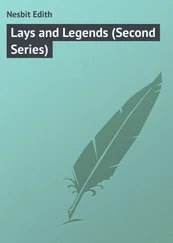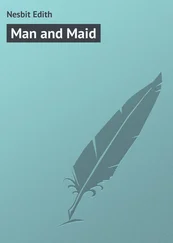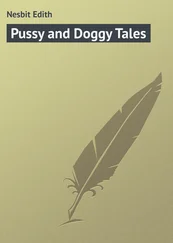Edith Nesbit - Wings and the Child - or, The Building of Magic Cities
Здесь есть возможность читать онлайн «Edith Nesbit - Wings and the Child - or, The Building of Magic Cities» — ознакомительный отрывок электронной книги совершенно бесплатно, а после прочтения отрывка купить полную версию. В некоторых случаях можно слушать аудио, скачать через торрент в формате fb2 и присутствует краткое содержание. Жанр: foreign_prose, на английском языке. Описание произведения, (предисловие) а так же отзывы посетителей доступны на портале библиотеки ЛибКат.
- Название:Wings and the Child: or, The Building of Magic Cities
- Автор:
- Жанр:
- Год:неизвестен
- ISBN:нет данных
- Рейтинг книги:3 / 5. Голосов: 1
-
Избранное:Добавить в избранное
- Отзывы:
-
Ваша оценка:
- 60
- 1
- 2
- 3
- 4
- 5
Wings and the Child: or, The Building of Magic Cities: краткое содержание, описание и аннотация
Предлагаем к чтению аннотацию, описание, краткое содержание или предисловие (зависит от того, что написал сам автор книги «Wings and the Child: or, The Building of Magic Cities»). Если вы не нашли необходимую информацию о книге — напишите в комментариях, мы постараемся отыскать её.
Wings and the Child: or, The Building of Magic Cities — читать онлайн ознакомительный отрывок
Ниже представлен текст книги, разбитый по страницам. Система сохранения места последней прочитанной страницы, позволяет с удобством читать онлайн бесплатно книгу «Wings and the Child: or, The Building of Magic Cities», без необходимости каждый раз заново искать на чём Вы остановились. Поставьте закладку, и сможете в любой момент перейти на страницу, на которой закончили чтение.
Интервал:
Закладка:
And you shall observe that the toys which the child loves best are always those toys which lend themselves to such symbolic use.
Christmas is at hand. You go to buy gifts for the child, in memory of that Other Child whose birthday gifts were gold, frankincense, and myrrh. You go into the toyshops, elbowing your way as best you can, looking for such toys as may aid the child in his work of creative imagination.
You find a vast mass and litter and jumble of incredible futilities – things made to sell, things made by people who have forgotten what it is like to be a child. Mechanical toys of all sorts, stupid toys, toys that will only do one thing, and that thing vulgar and foolish. And, worst outrage of all, ugly toys, monstrosities, deformities, lead devils, grinning humpbacked clowns, "comic" dogs and cats, hideous mis-shapen pigs, incredible negroes, intolerable golliwogs. All such things the natural child, with a child's decent detestation of deformity, will thrust from it with screams of fear and hatred, till the materialistic mother or nurse explains that the horror is not really, as the child knows it to be, horrible and unnatural, but "funny." Thus do we outrage the child's inborn sense of beauty, which is also the sense of health and fitness, and teach it that deformity is not shocking, not pitiable even, but just "funny." All these ugly toys are impossible as aids to clean imagination.
So, almost in as great, though not in so harmful a degree, is the "character doll." The old doll was a doll, and not a character. Therefore she could assume any character at your choice. The character doll is Baby Willy, and can never be anything else, unless imagination, exasperated and baffled, christens him Silly Billy in the moment of furious projection across the nursery floor. But the old doll, with her good, expressionless face and clear blue eyes, could be a duchess or a dairymaid, a captive princess or a greengrocer's wife keeping shop, a cruel stepmother or Joan of Arc. I beg you to try Baby Willy in the character of Joan of Arc.
You cannot hope to understand children by common-sense, by reason, by logic, nor by any science whatsoever. You cannot understand them by imagination – not even by love itself. There is only one way: to remember what you thought and felt and liked and hated when you yourself were a child. Not what you know now – or think you know – you ought to have thought and liked, but what you did then, in stark fact, like and think. There is no other way.
Do you remember the toys you liked, the toys you played with? Do you remember the toys you hated – after the fading of the first day's flush of novelty, of possession? The houses with doors that wouldn't open? The stables with horses that wouldn't stand up? The shops whose goods were part of their painted shelves, whose shopmen were as fast glued behind the counter as any live shop-assistant before the passing of the Shops Act?
And the mechanical toys – the clockwork toys. The engine was all right, even after the clockwork ran down for the last time with that inexorable whizz which told you all was over; you could build tunnels with the big brown books in the library and push the engine through with your hand – it would run quite a long way out on the other side. But the other clockwork things! How can one love and pet a mouse, no matter how furry its superficial exterior, when underneath, where its soft waistcoat and its little feet should be, there is only a hard surface from which incompetent wheels protrude? And the ostrich who draws a hansom cab, and the man who beats the boy with a stick? When they have whizzed their last, who cares for the tin relics outliving their detestable activities?
Think of the toys you liked: the Noah's Ark – full of characters. What stirring dramas of the chase, what sporting incidents, what domestic and agricultural operations could be carried out with that most royal of toys. Mr. Noah, I remember, was equally competent and convincing as ploughman or carter. But his chief rôle was Sitting Bull. His sons were inimitable as Chingachgook and scalp hunters generally. You cannot play scalp hunters with the mechanical ostrich indissolubly welded to a hansom cab.
You loved your bricks, I think, especially if you lived in the days when bricks were of well-seasoned oak, heavy, firm, exactly proportioned, before the boxes of inexact light deal bricks, with the one painted glass window, began to be made in Germany. How finely those great bricks stood for Stonehenge, and how submissively Anna, the Dutch doll, whose arms and legs were gone, played the part of the Sacrifice. If you remember those bricks you will remember the polished, white wooden dairy sets in oval white boxes – churns and tubs and kettles and pots all neatly and beautifully turned. You will remember the doll's house furniture, rosewood, duly mitred and dovetailed, fine cabinet-makers' work, little beautiful models of beautiful things. Now the dolls' house furniture is glued together. You can't trust a light-weight china doll to sit on the kitchen chairs… But you can get your mechanical ostrich and your golliwog…
Children in towns are cut off, at least for most of the year, from the splendid and ever-varying possibilities of clay and mud and sand, oak-apples and snow-berries, acorn-cups and seaweed, shells and sticks and stones which serve and foster the creative instinct, the thousand adjuncts to that play which is dream and reality in one.
For them, even more than for the happier country children, it is good to choose toys which shall possess, above and before all, the one supreme quality of a good toy. Let it be a toy that is not merely itself, like the ostrich of whom I hope you are now as weary as I, but a toy that can be, at need, other things. A toy, in fine, that your child can, in the fullest and most satisfying sense, play with.
CHAPTER IV
Imagination
To the child, from the beginning, life is the unfolding of one vast mystery; to him our stalest commonplaces are great news, our dullest facts prismatic wonders. To the baby who has never seen a red ball, a red ball is a marvel, new and magnificent as ever the golden apples were to Hercules.
You show the child many things, all strange, all entrancing; it sees, it hears, it touches; it learns to co-ordinate sight and touch and hearing. You tell it tales of the things it cannot see and hear and touch, of men "that it may never meet, of lands that it shall never see"; strange black and brown and yellow people whose dress is not the dress of mother or nurse – strange glowing yellow lands where the sun burns like fire, and flowers grow that are not like the flowers in the fields at home. You tell it that the stars, which look like pin-holes in the floor of heaven, are really great lonely worlds, millions of miles away; that the earth, which the child can see for itself to be flat, is really round; that nuts fall from the trees because of the force of gravitation, and not, as reason would suggest, merely because there is nothing to hold them up. And the child believes; it believes all the seeming miracles.
Then you tell it of other things no more miraculous and no less; of fairies, and dragons, and enchantments, of spells and magic, of flying carpets and invisible swords. The child believes in these wonders likewise. Why not? If very big men live in Patagonia, why should not very little men live in flower-bells? If electricity can move unseen through the air, why not carpets? The child's memory becomes a store-house of beautiful and wonderful things which are or have been in the visible universe, or in that greater universe, the mind of man. Life will teach the child, soon enough, to distinguish between the two.
But there are those who are not as you and I. These say that all the enchanting fairy romances are lies, that nothing is real that cannot be measured or weighed, seen or heard or handled. Such make their idols of stocks and stones, and are blind and deaf to the things of the spirit. These hard-fingered materialists crush the beautiful butterfly wings of imagination, insisting that pork and pews and public-houses are more real than poetry; that a looking-glass is more real than love, a viper than valour. These Gradgrinds give to the children the stones which they call facts, and deny to the little ones the daily bread of dreams.
Читать дальшеИнтервал:
Закладка:
Похожие книги на «Wings and the Child: or, The Building of Magic Cities»
Представляем Вашему вниманию похожие книги на «Wings and the Child: or, The Building of Magic Cities» списком для выбора. Мы отобрали схожую по названию и смыслу литературу в надежде предоставить читателям больше вариантов отыскать новые, интересные, ещё непрочитанные произведения.
Обсуждение, отзывы о книге «Wings and the Child: or, The Building of Magic Cities» и просто собственные мнения читателей. Оставьте ваши комментарии, напишите, что Вы думаете о произведении, его смысле или главных героях. Укажите что конкретно понравилось, а что нет, и почему Вы так считаете.












